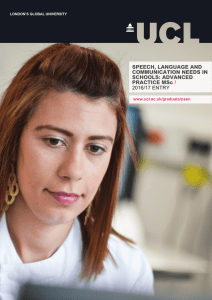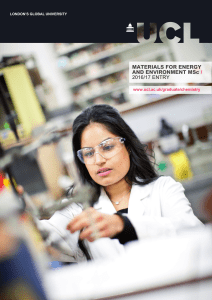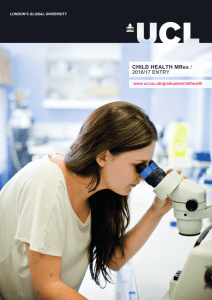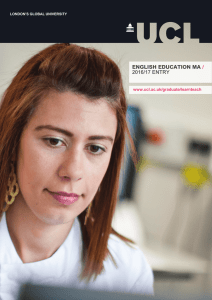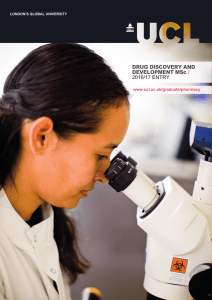GLOBAL HEALTH AND DEVELOPMENT MSc / 2016/17 ENTRY
advertisement
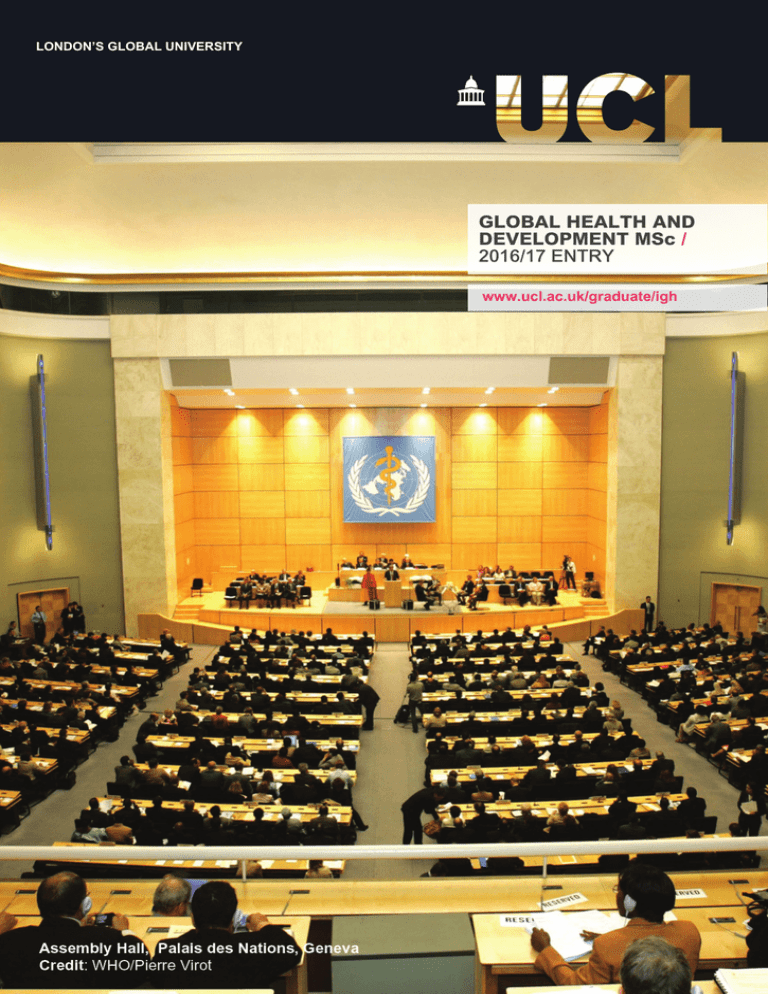
LONDON’S GLOBAL UNIVERSITY GLOBAL HEALTH AND DEVELOPMENT MSc / 2016/17 ENTRY www.ucl.ac.uk/graduate/igh Global Health and Development MSc / This MSc takes a unique cross-disciplinary approach to global health and attracts students from a range of academic and professional backgrounds. Students can craft a programme of study that suits their interests and which will help them become better global health practitioners wherever they work in the world. Degree summary The programme challenges students to understand the complex forces that shape health worldwide, by developing their understanding of the principles underlying research, policy and practice in global health, fostering critical thinking, and building transferable skills. // // UCL offers a multidisciplinary approach to studying global health. Students work alongside teachers, researchers and other students from a diverse range of disciplines and are taught by experts from several of UCL's faculties. These include health policy specialists, economists, philosophers, lawyers, political scientists, geographers, clinicians, nutritionists, anthropologists, and epidemiologists. We place particular emphasis on research-based teaching, and our academics use their current research as case studies. The programme is taught with an emphasis on collaborative and co-operative learning to ensure that students enter the workforce capable of joining projects and programmes where working in teams is important. Assessment is through written assignments, unseen written examinations, projects, oral presentations, group work, and the written dissertation. Degree structure Mode: Full-time: 1 year; Flexible: 2-5 years Students undertake modules to the value of 180 credits. The programme consists of four core modules (60 credits), four optional modules (60 credits) and a research dissertation (60 credits). A Postgraduate Diploma (120 credits, nine months full-time, two to five years flexible study) is offered. Students take four core modules (60 credits) and four optional modules (60 credits). A Postgraduate Certificate (60 credits, three months full-time, two years' flexible study) is offered. Students take four core modules (60 credits) CORE MODULES // Concepts and Controversies in Global Health // Research Methods and Evidence for Global Health // Power and Politics in Global Health // Health Systems in a Global Context OPTIONS // Options may include the following: // Climate Change and Health // Conflict, Humanitarianism and Health // Collecting and Using Data: Essentials of Quantitative Survey Research // Evaluating Interventions // Global Health Promotion // Global Health Metrics and Informatics // Health Management: Planning and Programme Design // Key Principles of Health Economics // Law and Governance of Global Health // Maternal Health in a Global Context // Nutrition and Public Health // Perinatal Epidemiology and Newborn Care // Urban Health DISSERTATION/REPORT // All MSc students undertake an individual research project on a topic relevant to future work in global health and development which culminates in a dissertation of 10,000 words. Your career The programme equips students with the knowledge and transferable skills they will need in their future careers in global health. Career routes include research, programme management, policy advice and advocacy, at national and international levels, and in public, private and not-for-profit sectors. Recent career destinations* include: // Europe External Action Service, Junior Professional in Delegation, Burundi, 2014 // UNDP Regional Centre for Europe & the CIS, HIV, Health and Development Consultant, 2014 // East London NHS Foundation Trust, Co-ordinator: Global Health Partnerships, 2014 // GAVI Alliance, Innovative Finance and Private Sector Partnerships Manager, 2012 // KPMG, Consultant in Healthcare, 2014 Employability This wide-ranging programme strives to create students who will be able to look at health problems from different angles and think analytically and critically – all key transferable skills in the job market. The diversity of approaches to global health taken by the programme helps expand students' employment horizons and options. * data taken from the ‘Destinations of Leavers from Higher Education’ survey undertaken by HESA looking at the destinations of UK and EU students in the 2010–2012 graduating cohorts six months after graduation and, where necessary, departmental records. Entry requirements Normally a minimum of an upper second-class UK Bachelor's degree or an overseas qualification of an equivalent standard. Professional experience in the fields of health and development is desirable. An applicant whose qualifications vary from UCL standards may be admitted if evidence of an adequate academic background and work experience in an appropriate field can be shown. English language proficiency level FEES AND FUNDING // UK & EU (2016/17) entry: £9,020 (FT) // Overseas (2016/17) entry: £17,770 (FT) Fees note: Fees for flexible, modular study are charged pro-rata to the appropriate full-time Master's fee taken in an academic session. The tuition fee schedule for 2016/17 entry can be viewed on the UCL Current Students website. Home/EU applicants may apply for the IGH Postgraduate Bursaries If your education has not been conducted in the English language, you will be expected to demonstrate evidence of an adequate level of English proficiency. Applicants who are residents and nationals of an African nation may apply for an African Graduate Scholarship. The level of English language proficiency for this programme is: Good. Applicants from developing Commonwealth countries may apply for the Commonwealth Shared Scholarship Scheme. Information about the evidence required, acceptable qualifications and test providers is provided at: www.ucl.ac.uk/graduate/english-requirements Full details of funding opportunities can be found on the UCL Scholarships website: www.ucl.ac.uk/scholarships Your application The deadline for all applicants is 29 July 2016. Students are advised to apply as early as possible due to competition for places. Those applying for scholarship funding (particularly overseas applicants) should take note of application deadlines. When we assess your application we would like to learn: // why you want to study Global Health and Development at graduate level // how your academic and professional background meets the demands of this challenging programme // // // why you want to study Global Health and Development at UCL what particularly attracts you to this programme where you would like to go professionally with your degree Together with essential academic requirements, the personal statement is your opportunity to illustrate whether your reasons for applying to this programme match what the programme will deliver. Details on how to apply are available on the website at: www.ucl.ac.uk/graduate/apply PDF Updated: May 25, 2016 Information correct at time of going to press. See website (www.ucl.ac.uk/igh) for latest information APPLICATION DATE All applicants: 29 July 2016 CONTACT Mrs Paloma Garcia-Paredes Email: ghd@ucl.ac.uk Telephone: +44 (0)20 7905 2646
